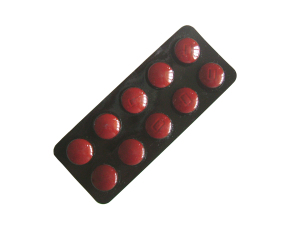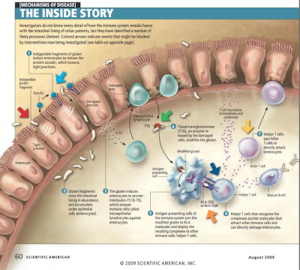
This is the second in a series of posts on digestive health and leaky gut. If you haven’t read the first post, you can find it here. It discusses how the digestive system is supposed to work and why leaky gut is so dangerous to the overall health of the body. As a quick reminder, here is a brief summary:
The cells in the gut lining, as well as the proteins that hold them together (known as tight junctions) deteriorate, effectively creating “leaks” in the gut barrier. This means that our immune system has been seriously compromised. This is never ideal, but it is especially risky at this time of year! The separation between cells also allows undigested food particles, bad bacteria and environmental toxins to bypass the strictly regulated absorption process and go directly into the bloodstream, where they do not belong. Once in the bloodstream, chronic inflammation is inevitable. Additionally, food particles, bacterium or toxins can trigger an inappropriate immune response by the body, leading to an autoimmune reaction.
It is clear that maintaining the integrity of our digestive tract is pivotal for reducing total-body inflammation and supporting a healthy immune system that will protect us from pathogens and not misidentify our own tissues as pathogenic! So what actually triggers the gut lining to deteriorate?
What Causes Leaky Gut?
1. Food
Every bite of food we eat comes into contact with our digestive tract lining. Therefore it makes sense that food will have a significant impact on gut health. The following foods are the riskiest when it comes to intestinal permeability. I apologize in advance for the highly technical jargon, especially with regards to gluten. Scroll down to the last few sentences starting with “MORAL OF THE STORY” to skip over the science!
-

© marin Gluten is a prolamin found in wheat, which has been shown to actively cause leaky gut by stimulating the release of a protein called zonulin. Zonulin then acts on tight junctions, causing them to unravel and effectively open up a channel directly into the body. As we have already discussed, this impaired gut function puts our entire body at risk by allowing damaging molecules directly into the bloodstream. Not only does gluten open the channels up, but it is also one of those damaging food particles. The body often recognizes gluten as a foreign particle and starts sending its army of antibodies to get rid of it. Unfortunately, the amino acid sequence of gliadin (part of the gluten molecule) is similar to the amino acid sequence of other tissues in the body. This becomes a case of mistaken identity where the body’s antibodies start attacking its own tissues because it thinks it’s gluten. Common tissues this occurs in is the brain, skin, joints, gallbladder, liver and thyroid, so it is recommend that autoimmune cases such Hashimoto’s & Graves, Psoriasis, and Arthritis avoid gluten for life. Ingestion of gluten can also result in an antibody attack on tissue transglutaminase (tTG). tTG is an enzyme that is responsible for forming tight protein linkages which creates barriers and stable structures, specifically by creating a connection point with fibrinogen within the extracellular matrix. In the case of celiac disease, ingestion of gluten results in the gut cells releasing tTG2 to heal the initial damage. The body then attacks the tTG2 which causes complete destruction of the entire cell – a process known as villous atrophy. tTG is not isolated to the digestive tract though. tTG3 is found in the skin and implicated in dermatitis herpataformis (a skin-based manifestation of celiac disease, most often unaccompanied by any digestive concerns). Most recently discovered was tTG6, located on neurons within our central nervous system. This has been implicated in various neurological disorders. MORAL OF THE STORY: Gluten has the potential to be devastating to our gut and total body health. Unless your body is already running optimally (lucky you!) consider removing this damaging food. Other than wheat, gluten is found in spelt, barley, rye, oats and kamut – not to mention it is hidden in many food products. You can download a helpful guide for hidden sources of gluten here.
- Wheat also contains wheat germ agglutinin, which causes intestinal inflammation, leaky gut, vitamin D deficiency, acts like insulin (ie. stores fat) and damages our red blood cells.
- Sugar suppresses the immune system and supports the growth of pathogenic gut bacteria and yeast, which in turn promote leaky gut.
- Alcohol directly causes leaky gut by weakening tight junctions. It also depletes the body of key nutrients and can feed pathogenic gut bacteria and yeast.
- Dairy has less understood about its mechanism on gut health. It seems to be much more individual because many people tolerate dairy just fine. It is associated with elevated risk of gut permeability, however this is in the absence of certain probiotics, suggesting that the damage dairy causes may be secondary to the bacterial terrain of the individual. That being said, dairy is known to be a major food allergen and it is a common cross-reactor with gluten (ie. if you are sensitive to gluten, you are likely sensitive to dairy), and we know that consumption of food allergens is associated with gut inflammation.
There are 2 other groups of foods that can cause trouble for some individuals – grains and legumes. Since plants can’t run away from their predators they have to protect themselves in other ways. One way is by containing chemicals that inflict pain and damage, and/or prevent us from absorbing the nutrients. The end goal being their predator smartens up and stops eating them. Lectins, which are found in highest concentrations in grains, are problematic for a few reasons. They are difficult to digest which can lead to an overgrowth in pathogenic gut bacteria and they have the ability to cause direct gut damage. The most common and most damaging lectin is gluten. Saponins, found in legumes and pseudo-grains like quinoa, act like a soap and break up the cell membrane (composed of fatty acids and cholesterol) of all tissues it touches, including the digestive tract. Damaged cell membranes result in the inability for cells to function properly. Saponins also trigger the pro-inflammatory cytokine cascade, which means they cause inflammation by stimulating the immune system. This can be very damaging for individuals who have an overactive immune system already, as in the case of autoimmunity. Legumes such as soy contain protease inhibitors, which significantly limit our ability to digest protein. So even if the legume has a moderate amount of protein in it, we are often unable to fully digest and absorb that protein.
2. Stress
When our body is exposed to a stress (financial, emotional, food sensitivity, environmental toxin…anything!) it only has one way of responding. It responds the same way it would if you are confronted with a grizzly bear. It diverts all of its energy and resources to the organs and tissues required to fight or run away, with the singular goal of saving your life. It does this by sending a flood of hormones through your body, one of which is the hormone is cortisol. When cortisol is released, it causes a weakening of the tight junctions which keep your gut lining in tact. It also diverts blood away from digestion (because clearly nutrient absorption is not a priority right now!) which slows down gut transit time. Slowed transit time, or constipation, results in an overgrowth of bad bacteria which can cause and/or worsen leaky gut.
Another stress-hormone called corticotropin-releasing hormone (CRH), opens tight junctions in all barriers within our body – gut, skin, lung, and blood-brain. This puts our body at a significant disadvantage when it come to fighting off pathogens. Exercise is a great way to manage stress in the body, but it is important to recognize that exercise is also inherently a stressor. Overtraining causes elevated cortisol and CRH, and chronically diverts blood away from digestive processes. This lack of blood supply causes damage to the gut cells, which in turn, increases susceptibility to leaky gut. Additionally, prolonged and high intensity exercise can directly cause tight junction damage.
3. Pharmaceuticals
 Medications can cause or worsen leaky gut. Interestingly, one of the most implicated groups of pharmaceuticals are NSAIDs such as ibuprofen and aspirin. It is not uncommon for people to casually pop a few Advil on a daily basis to manage a headache, injury or muscle soreness from overtraining. Only use ibuprofen when absolutely necessary, and consider working with a holistic health practitioner to determine why you require an anti-inflammatory drug so frequently.
Medications can cause or worsen leaky gut. Interestingly, one of the most implicated groups of pharmaceuticals are NSAIDs such as ibuprofen and aspirin. It is not uncommon for people to casually pop a few Advil on a daily basis to manage a headache, injury or muscle soreness from overtraining. Only use ibuprofen when absolutely necessary, and consider working with a holistic health practitioner to determine why you require an anti-inflammatory drug so frequently.
4. GMOs
Genetically Modified Foods are a newer concern in our food supply. While there are no studies proving the harm of GMOs, unfortunately there are also no long term studies on their safety. One of the major concerns is some GMO crops, such as corn, have been genetically modified to secrete their own pesticide. This pesticide works by damaging the gut lining of the insects that eat it, causing their gut bacteria to flood their body and eventually causing death by blood infection. There is growing concern that the same action may occur on human digestive tracts as well. Avoid common GMOs by choosing organic corn, soy, canola and sugar – or avoid these foods altogether!
Summary
Start taking care of your digestive tract by eliminating harmful foods such as gluten, sugar, dairy and alcohol. Avoid GMO foods and unnecessary pharmaceuticals. Check in with the amount of stress in your life and work on managing it. Exercise in moderation based on your individual health level, adopt a meditation practice, learn to say no and make sure to ask for help!
One of the things I always preach is to focus on what TO DO, not what NOT TO DO, but in this case I had to lay down the groundwork to emphasize the WHY. So check out part 3 – Healing Leaky Gut – where I discuss what foods promote a healthy gut, how to provide your body with nutrients required for healing and what lifestyle changes can make a big difference!

